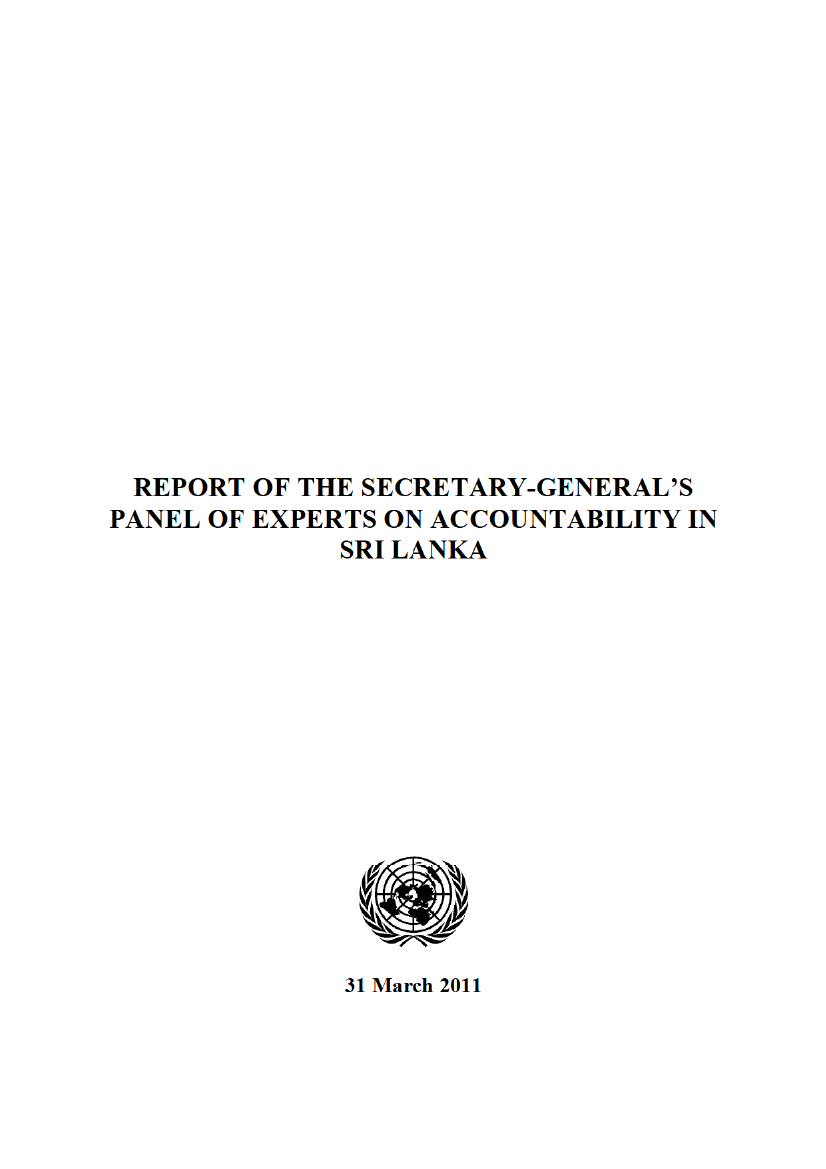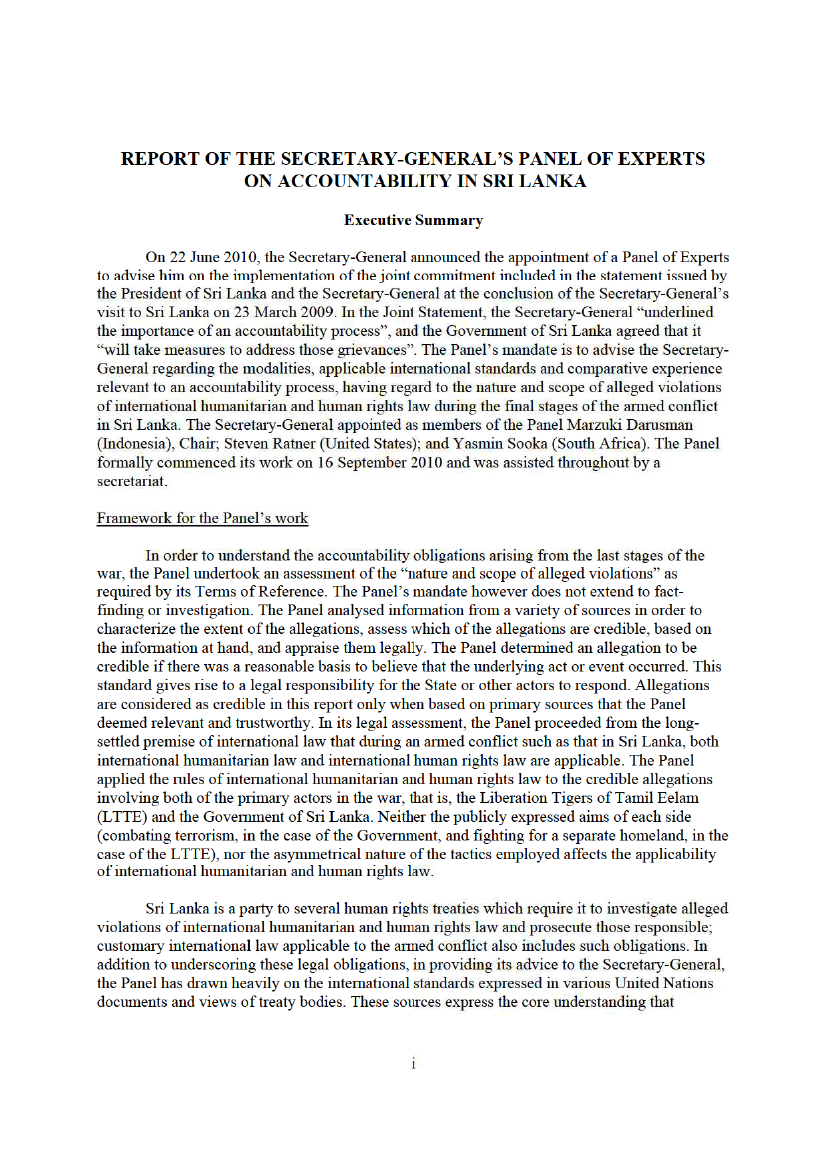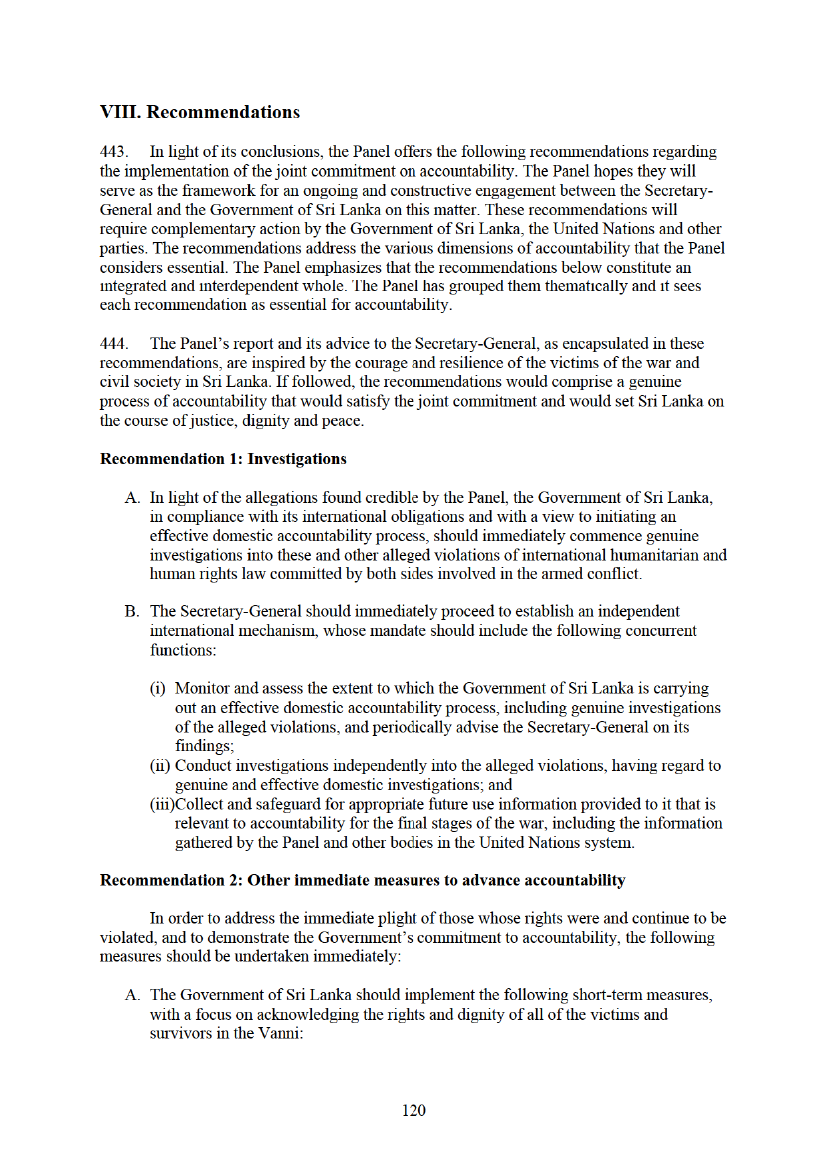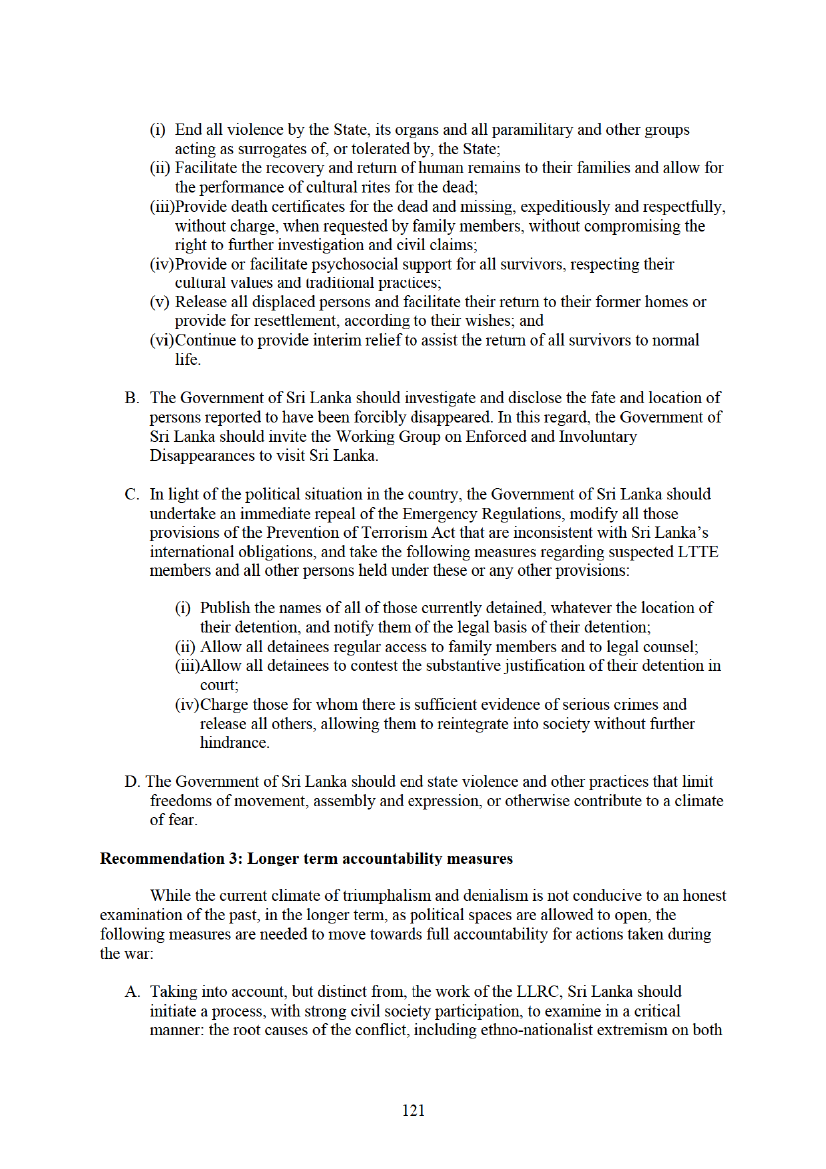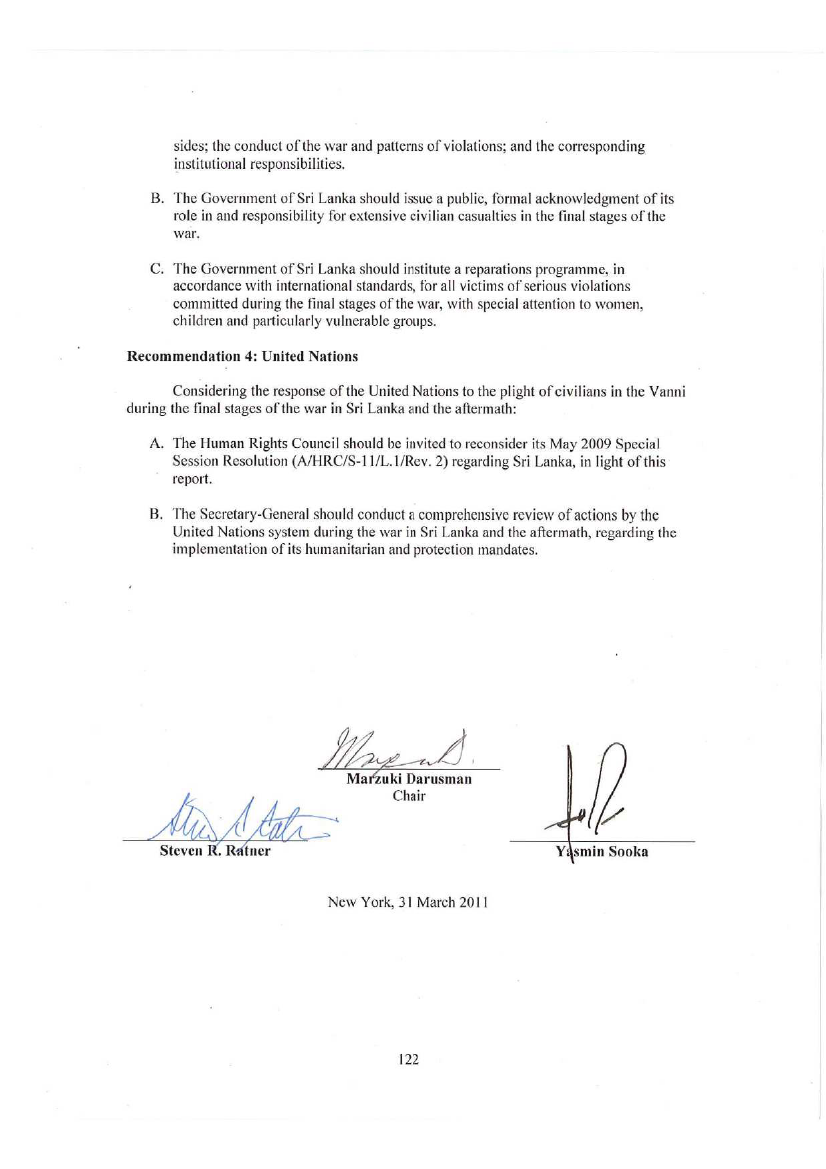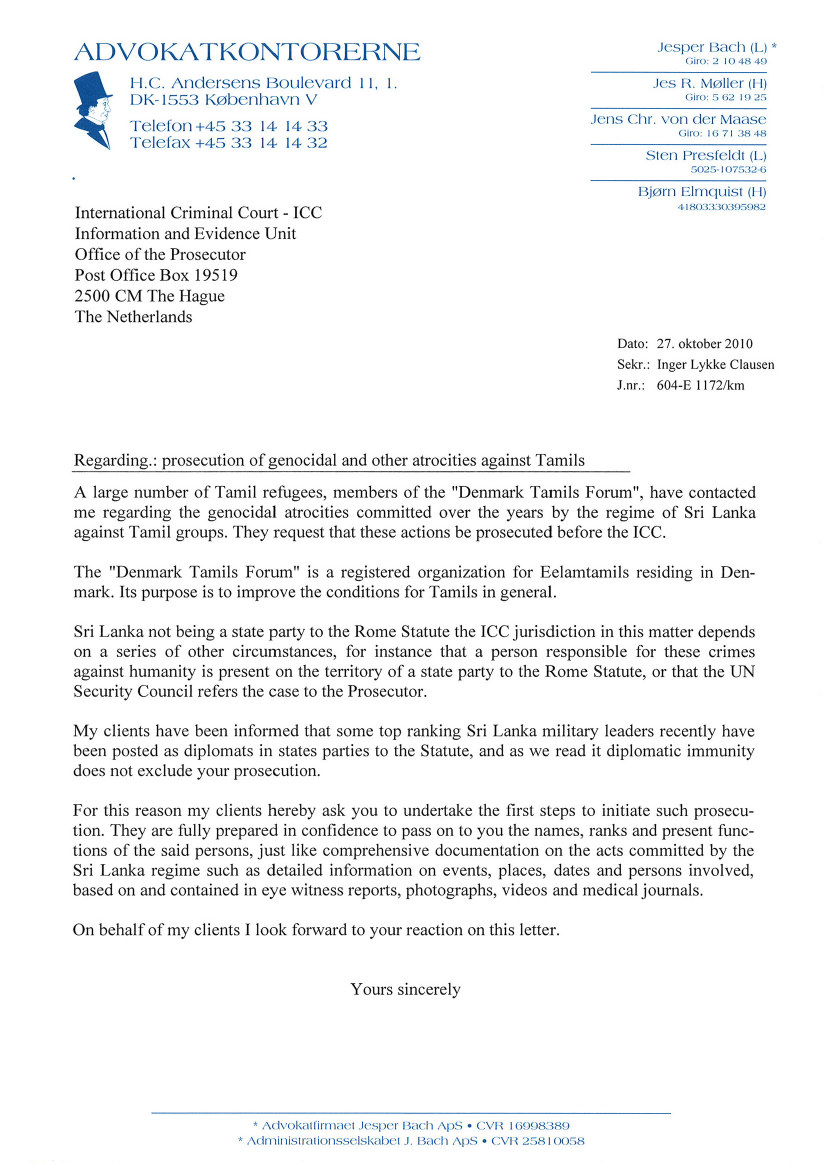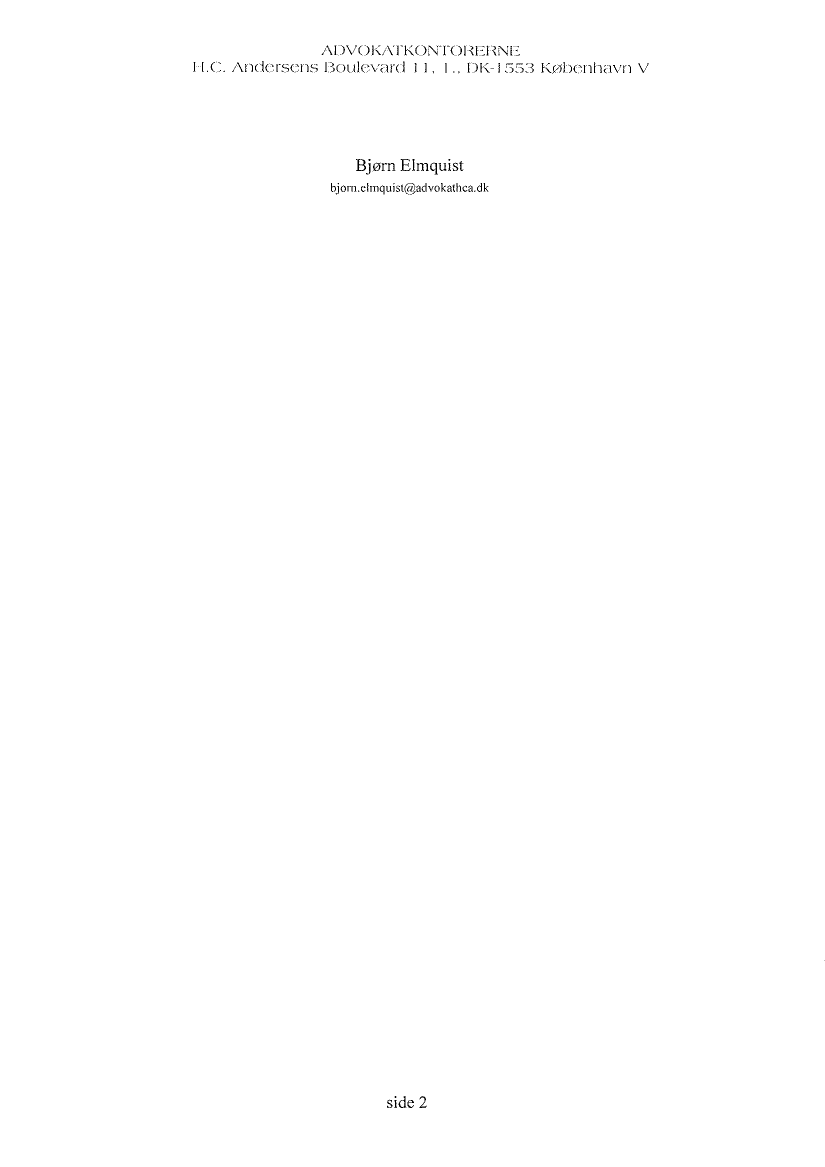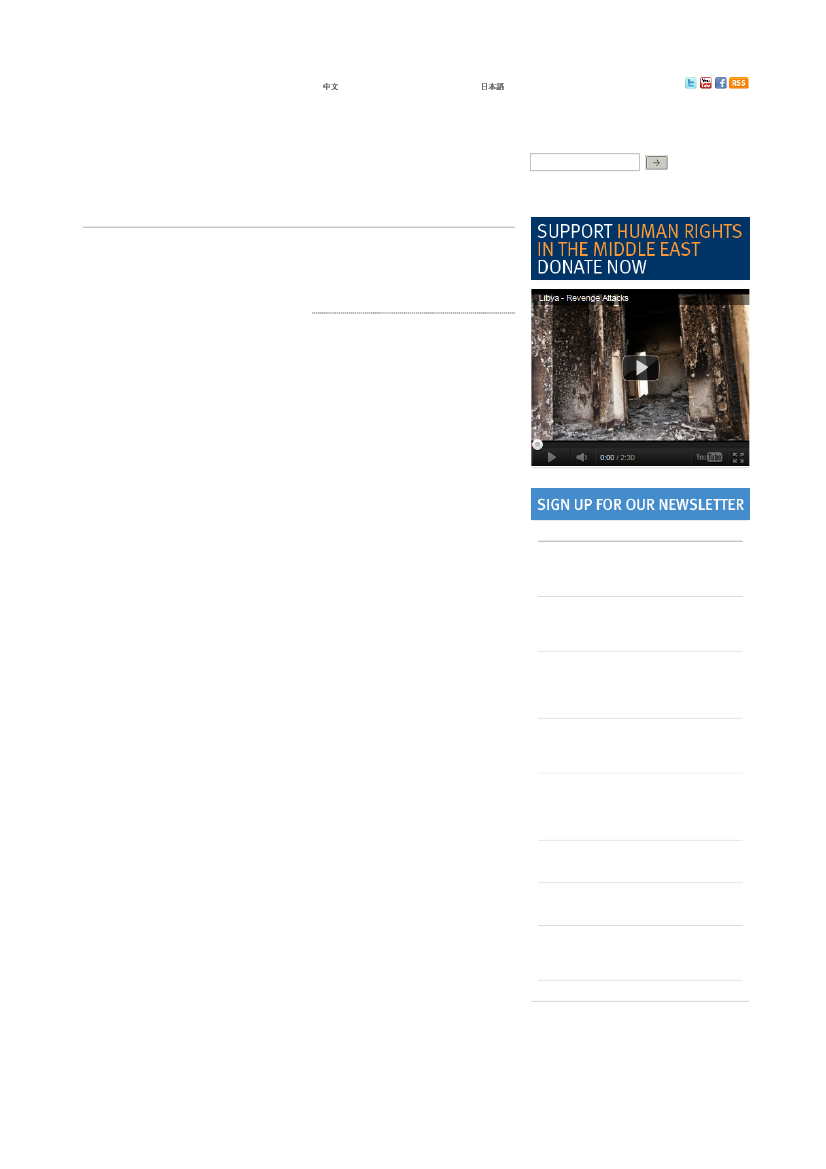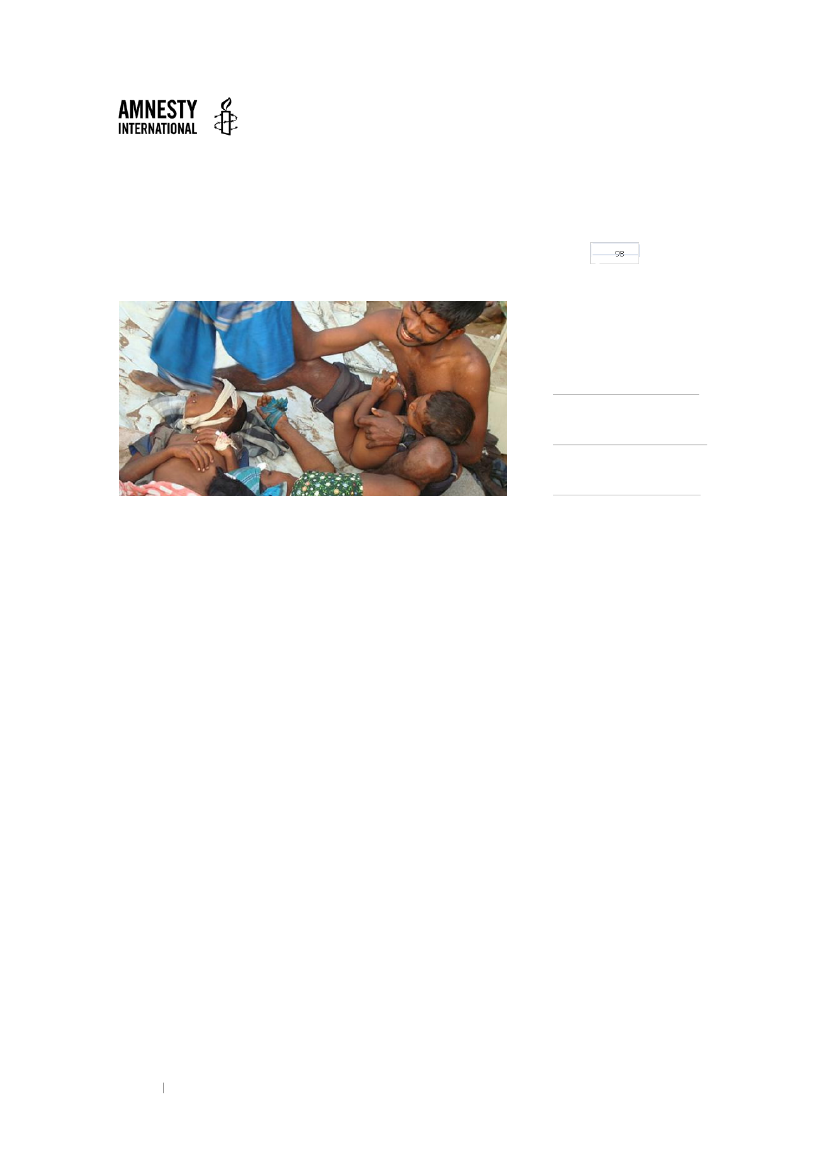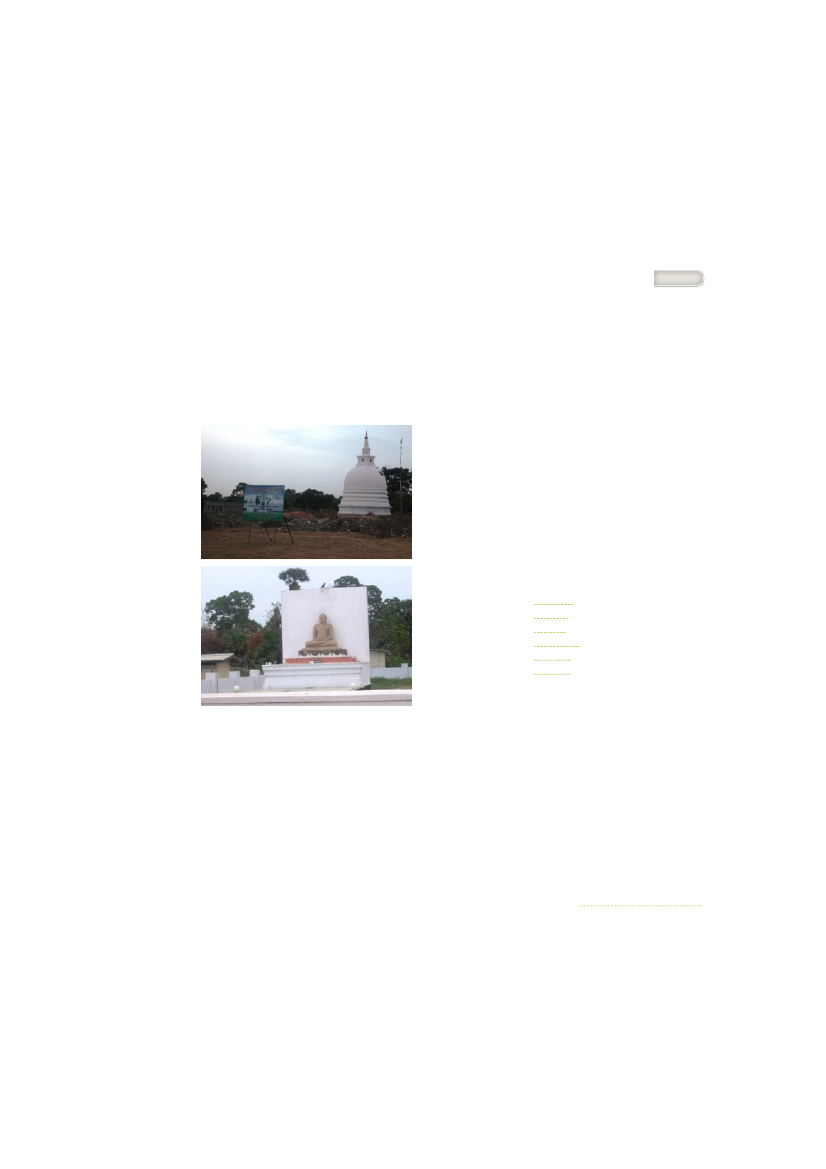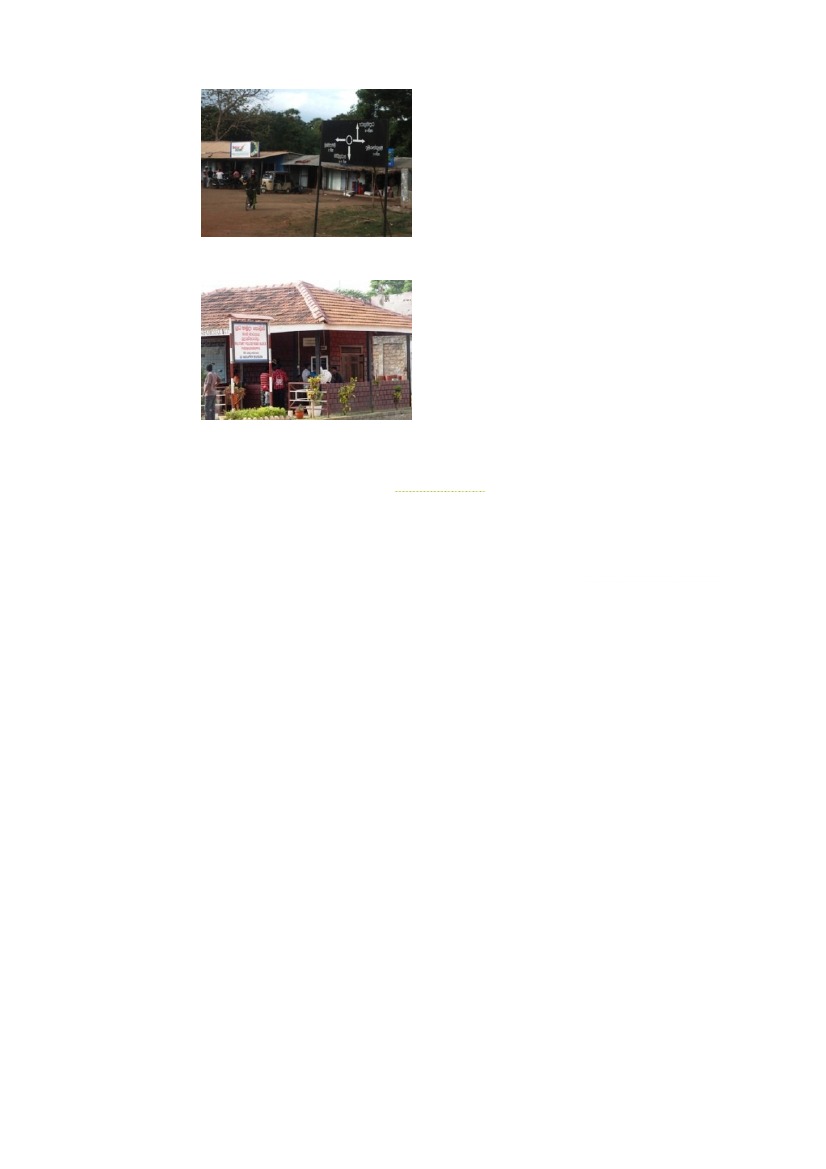Udenrigsudvalget 2011-12
URU Alm.del Bilag 30
Offentligt
nld;khHf; jkpoH NguitDansk Tamilsk ForumDenmark Tamils ForumDamager 187120 VejleCVR.: 32610447
Materialer til deputation d. 08.11.2011 kl. 13.30 vedr. SriLanka
Tel.:+4552173671 telefontid: 10-12 og 19-22Web:www.dansktamilskforum.dkMail:[email protected]Bank:Sparekassen:Reg.nr.: 9690 Konto: 0000591807Vejle d.04.november 2011
For at gøre vores fremmøde så fyldigt som muligt sender viher noget indledende materiale som vores deputation vil omhandle. Da deputation foregår over etkort tidsinterval, håber vi på at I vil gennemse så meget af flg. materiale som muligt.
1. Historien omkring hvorfor danske tamilere befinder sig i Danmark;a. CD – En nation bløder – Dokumentar lavet af tamilske Diasporab. A Brief History of the Eelam Tamils’ Struggle for Survivalc. Folkeafstemning I DK for tamilerne - Valgresultat2. Krigsforbrydelser på Sri Lankaa. Uddrag fra FN’s ekspertpanels rapportb. CD – Sri Lankas Killings Fields – Dokumentar fra britiske Channel 4c. DTF ligger sag mod Sri Lanka ved International Straffedomstold. Menneskerettighedsorganisationera. Human Rights Watch: Act on SL reportb. International Crises Group: Reconciliation hader than everc. Amnesty International Commonwealth: Leaders must stop SL as host3. Situationen for tamilerne og den tamilske nation i daga. Grease Devil – systematisk overgreb på civile tamilereb. Udslettelse af tamilsk kulturarvc. Angreb på tamilsk parlamentsmedlemd. Angreb på tamilsk studenterrådsformande. SL military cancels resettlement
Del 1 fortæller i grove træk hvilke undertrykkelser tamilerne har været ude for og af den grund harværet nødsaget til at flygte.
Udenrigsudvalg_Deputation 2011
1
nld;khHf; jkpoH NguitDansk Tamilsk ForumDenmark Tamils ForumDamager 187120 VejleCVR.: 32610447
60 års uafhængighedskamp mundede til sidst ud i et blod-bad/folkemord i maj 2009 hvor utallige krigsforbrydelser blevbegået. Del 2 omhandler dette.
Tel.:+4552173671 telefontid: 10-12 og 19-22Web:www.dansktamilskforum.dkMail:[email protected]Bank:Sparekassen:Reg.nr.: 9690 Konto: 0000591807Vejle d.04.november 2011
Del 3 omhandler aktuelle situation for tamilerne på Sri Lanka, hvor vi bare har medtaget nogle ek-sempler på de utallige overgreb, som tamilerne fortsat bliver udsat for af det singalesiske overherre-dømme.
MvhRemmon WashingtonTalsmand og SekretærDansk Tamilsk Forum
Udenrigsudvalg_Deputation 2011
2
nld;khHf; jkpoH NguitDansk Tamilsk ForumDenmark Tamils ForumDamager 187120 VejleCVR.: 32610447
A Brief History of the Eelam Tamils’ Struggle forSurvivalTamils have inhabited a defined territory, the North
Tel.:+4552173671 telefontid: 10-12 og 19-22Web:www.dansktamilskforum.dkMail:[email protected]Bank:Sparekassen:Reg.nr.: 9690 Konto: 0000591807Vejle d.04.november 2011
and East contiguous part of the island of Ceylon, as a distinct nation for more than two millennia.Historically, the term “Eelam” referred to the entire island and the North and East part which isTamils’ traditional homeland was called “Tamil Eelam.” There is ample archaeological evidenceto prove the existence of three kingdoms (one Tamil and two Sinhalese) in the island prior to thearrival of the Europeans in the 15thcentury. In June, 1799, Sir Hugh Cleghorn, the first British Co-lonial Secretary wrote to the British Government “Two different nations from a very ancient periodhave divided between them the possession of the Island. First the Sinhalese, inhabiting the interiorof the country in its Southern and Western parts, and secondly the Malabars (Tamils) who possessthe Northern and Eastern Districts. These two nations differ entirely in their religion, language andmanners.” However in 1833, these distinct nations occupying the island were combined under asingle rule, for administrative convenience, by the British.By late 1860s, the British also brought a large number of Tamils from India to develop thecoffee/tea plantations in the central part of the island. When the British granted independence toCeylon in 1948, they left a secular country with Sinhalese, Tamil, and English as official languagesand Article 29 in the constitution protecting the rights of the Tamils, because they were a minoritygroup within the whole island. Unfortunately, the Sinhalese politicians used their numerical majori-ty in the parliament to enact a series of legislation that deprived the Tamils of their right to exist inthe island as equal citizens.
Disenfranchisement of Tamils:By 1949, over one million Tamils of Indian origin, working in the tea plantations of the cen-tral hills of the island, were disenfranchised by Prime Minister D.S. Senanayake. This reduced theTamil representation in parliament by 40%. Both major Sinhalese parties were competing witheach other to prove to the Sinhalese voters that they are more anti-Tamil than the other party.
Udenrigsudvalg_Deputation_2011
1
nld;khHf; jkpoH NguitDansk Tamilsk ForumDenmark Tamils ForumDamager 187120 VejleCVR.: 32610447
Buddhism made State Religion:A major electoral promisein the second parliamentary election in 1952 was to makeBuddhism the State religion because 90% of the Sinhalese areBuddhists, while the Tamils are mostly Hindus, Christians, orMuslims. Accordingly, Buddhism was made the state religion.
Tel.:+4552173671 telefontid: 10-12 og 19-22Web:www.dansktamilskforum.dkMail:[email protected]Bank:Sparekassen:Reg.nr.: 9690 Konto: 0000591807Vejle d.04.november 2011
“Sinhala Only” the Official Language:To counter this, Mr. S.W.R.D. Bandaranayake of the opposition Sinhalese party won thethird election in 1956 by pledging to make “Sinhala Only” as the official language of the entire isl-and. An agreement made with the Leader of the Tamils, Mr. S.J.V. Chelvanayagam, to allow rea-sonable use of Tamil in the North and East, was torn up the very next day due to violent protests byBuddhist monks.The “Sinhala Only” law deprived hundreds of thousands of Tamil government
servants, who did not know Sinhalese language, of their jobs. The Tamil politicians staged non-violent Gandhian-style protests which were violently put down by government sponsored Sinhalesethugs.
Pogroms against Tamils:The simmering violence by Sinhalese government sponsored thugs against the civil disobe-dience campaign by the Tamils escalated and by 1958, the Tamils living outside of the North andEast of the island were attacked by the Sinhalese mobs with thousands being murdered, women andchildren burnt alive, and their property worth millions set on fire. The Tamils were subjected tocollective punishment for peacefully demanding their rights. Not a single person has ever beencharged for this pogrom and no compensation was ever given to the Tamils for the loss of life andproperty.
Abrogated Pacts:In 1965, Sinhalese Prime Minister Dudley Senanayake made the “Dudley-Chelva Pact” withTamil leader Mr. S.J.V. Chelvanayagam to provide federal rule in the North and East of the island.However, violent protest by the Sinhalese masses resulted in this pact being abrogated immediately.Once again, the Tamils who were non-violently doing a “sit-in” protest in front of government of-
Udenrigsudvalg_Deputation_2011
2
nld;khHf; jkpoH NguitDansk Tamilsk ForumDenmark Tamils ForumDamager 187120 VejleCVR.: 32610447
fices were violently attacked by Sinhalese thugs with tacitsupport of the government controlled police.
Tel.:+4552173671 telefontid: 10-12 og 19-22Web:www.dansktamilskforum.dkMail:[email protected]Bank:Sparekassen:Reg.nr.: 9690 Konto: 0000591807Vejle d.04.november 2011
Colonization by Sinhalese of Traditional Tamil Homel-and:In the name of development, major irrigation development schemes were commissioned inthe traditional homelands of the Tamils and the newly developed land was settled with Sinhalese asa way to alter the demography of the North and East of the island. The North and East were geo-graphically dry lands in the island. The Tamils had to work hard to get ahead and traditionally theyvalued education as a means to emancipation.
Denial of Educational Opportunities:Many Tamils were educated in the Christian Missionary schools setup in the North and Eastto advance their career potential. By 1970, the Sinhalese majority government enacted laws (“stan-dardization” of university entrance) to cap the number of Tamil students entering the universities,which were all funded and controlled by the government.
Tamils were not a party to the 1972 Republican Constitution of Sri Lanka:In 1972, the government enacted a Republican Constitution and severed all ties to the BritishCrown. The island of Ceylon was renamed “Sri Lanka” which is the Sinhalese name of the island.The Tamils boycotted this constitution because even the minimal protection afforded by the BritishPrivy Council was repealed from the statutes and their very existence in the island was being ig-nored in the document. The total subjugation of the Tamils in the island has become entrenched inthe Sinhalese psyche and in the constitution.
Arrest and torture of Tamil Youth with Impunity:The Tamil students who organized non-violent sit-in campaigns were arrested, tortured, andincarcerated. In 1977, the Prevention of Terrorism Act came into force which gave sweeping pow-ers to the All-Sinhala police to arrest, detain, and torture Tamil youth merely on suspicion. The
Udenrigsudvalg_Deputation_2011
3
nld;khHf; jkpoH NguitDansk Tamilsk ForumDenmark Tamils ForumDamager 187120 VejleCVR.: 32610447
Tamil youth became disillusioned with the non-violent strug-gle from which spanned from 1948 to 1976.
Tel.:+4552173671 telefontid: 10-12 og 19-22Web:www.dansktamilskforum.dkMail:[email protected]Bank:Sparekassen:Reg.nr.: 9690 Konto: 0000591807Vejle d.04.november 2011
Tamil Consensus Builds to Secede from Sinhalese rule:The Tamil political parties gathered together to chart a new strategy to advance the strugglefor justice. They formed the Tamil United Liberation Front (TULF) and asked for a mandate fromthe Tamils to “Form an independent separate state called Tamil Eelam” which was referred to as the1976 Vaddukkoddai Resolution. The TULF won a land slide victory with over 82% of voters livingin the North and East ratifying the call for Independence of Tamil Eelam. This was the last freeelection conducted amongst the Tamils in the island. The Sinhalese response was swift. Withinweeks, the 1977 anti-Tamil pogrom was unleashed on the Tamil civilians living outside of theNorth and East of the island. Over 3000 Tamils, including women and children, were massacred;billion worth of Tamil owned property was set on fire. Hundreds of thousands of Tamils weremade refugees over-night and were sent by ships to the North and East for their safety.Once
again, a commission was appointed, resulting with no one being punished for their crimes and nocompensation for the death and destruction!
Pogroms Against Tamils Escalates to cultural genocide:The escalating violence against innocent Tamils continued from 1956, 1958, 1974, 1977,1978, 1979, and 1981 culminating in a major pogrom in 1983. In 1981, the Jaffna Public Librarycontaining rare and ancient Tamil manuscripts was set on fire under the watchful eyes of two gov-ernment ministers. Tamil people who attempted to put out the fire were prevented by the police andSinhalese thugs. The burning of a Tamil literary treasure was seen ascultural genocideof the Ta-mils. The armed struggle for independence began to take shape around this time. Many Tamilyouths joined the different armed groups as self-defense and to put an end to the violence unleashedon them by the Sinhalese government.
Short-lived Indian Intervention:The escalating attack on the Tamils resulted in India sending the Indian Peace Keeping Force
Udenrigsudvalg_Deputation_2011
4
nld;khHf; jkpoH NguitDansk Tamilsk ForumDenmark Tamils ForumDamager 187120 VejleCVR.: 32610447
(IPKF) in 1987. However, neither the Indian government northe Sinhalese government was sincere in finding a lastingsolution to the problems faced by the Tamils. The IPKF be-gan attacking the dominant Tamil militant group (LTTE) with
Tel.:+4552173671 telefontid: 10-12 og 19-22Web:www.dansktamilskforum.dkMail:[email protected]Bank:Sparekassen:Reg.nr.: 9690 Konto: 0000591807Vejle d.04.november 2011
a view to installing its own puppet Tamil paramilitary group. In the ensuing violence, the IPKFwhich came to help the Tamils began killing them indiscriminately. The Sinhalese, fearing the In-dians will stay in the island, also wanted the IPKF sent out at any cost. In the South, Mr. Premada-sa became the President in the next election, promising to send the IPKF out. After the election, theIPKF was unceremoniously asked to leave the island. With that, the Indo-Lanka Accord signedbetween Indian Prime Minister Rajiv Gandhi and then Sri Lanka President J.R. Jayewardene be-came defunct. This is the first time a third-party was involved in a pact which became ineffective.There is simply no will on the part of successive Sinhalese governments to treat Tamils as equalpartners within one country.
Rise of the Tamil self-rule:From 1990 to 1995, the LTTE ruled the Jaffna peninsula. However, the Sinhalese govern-ment wanted to re-take the peninsula and started a major military offensive against the peninsula in1995. The LTTE and over half-million Tamil civilians evacuated the peninsula within days andmoved to the Northern mainland called “Vanni.” From 1995 to 2001, the LTTE ruled Vanni areadespite frequent skirmishes with the GoSL army. Indiscriminate aerial bombardment by the GoSLair force was met with targeted attack by the LTTE in the South. Life becomes uncertain in theentire island. In 2001, the LTTE dealt a devastating attack on the main air force base adjacent tothe only International Airport and destroyed more than half the aircrafts belonging to Air Lanka, agovernment airline that brought tourists to the country. With daily life in the South disrupted, theSinhalese people wanted peace and elected Mr. Ranil Wickremasinghe as Prime Minister.
Norwegian Sponsored Peace Accord:In 2002, a Norwegian-Government-mediated Peace Accord was signed between the LTTEon behalf of the Tamils and Prime Minister Ranil Wickremasinghe on behalf of the Government ofSri Lanka (GoSL). It should be noted that, Mr. Wickremasinghe came to power promising to make
Udenrigsudvalg_Deputation_2011
5
nld;khHf; jkpoH NguitDansk Tamilsk ForumDenmark Tamils ForumDamager 187120 VejleCVR.: 32610447
a negotiated settlement with the LTTE. The peace accordrecognized LTTE as the sole representatives of the Tamilsand ceded 18,000 sq.km of Tamil homeland under its control.From 2002 to 2009, the LTTE ruled the Vanni and hinterland
Tel.:+4552173671 telefontid: 10-12 og 19-22Web:www.dansktamilskforum.dkMail:[email protected]Bank:Sparekassen:Reg.nr.: 9690 Konto: 0000591807Vejle d.04.november 2011
in the East with its own police, law courts, taxation office etc. In the 2004 election, the Tamil par-ties contested as a proxy for the LTTE in the Tamil areas stating that a vote for them is really a votefor the LTTE and won 22 out of 24 seats. Talks between LTTE and GoSL continued in Thailand,Berlin, Oslo, Finland, and Geneva. Even though, Mr. Wickremasinghe’s government was negotiat-ing, the President Chandrika Kumaratunge-Bandaranayake, who belonged to the opposition party,vetoed any agreements from being implemented.once more for a negotiated settlement.This frustrated the Tamils who were longing
Rise of Mr. Rajapakse:In the 2005 Presidential election, Mr. Mahinda Rajapakse came to power with a landslidevictory by accusing Mr. Wickremasinghe of ceding too much to the Tamils. The Tamils boycottedthe Presidential election because they did not consider the constitution to be valid. The Sinhalesehad to decide between the hard-line chauvinist Mr. Mahinda Rajapakse and the peace-negotiatorMr. Wickremasinghe. The Sinhalese people chose Mr. Rajapakse who vowed not to cede an inchto the Tamils. While the Norwegian-sponsored peace accord prevented the LTTE from re-arming,the GoSL was free to increase its armed forces and procure lethal and banned weapons. Mr. Raja-pakse, being left-oriented, forged closer ties with China and started to attack areas under the controlof LTTE.
Massacre of Tamils:The GoSL formally withdrew from the peace accord in 2008 and began aerial bombardmentof the Tamil areas. Civilians including hospitals were targeted. All INGO personnel were asked toevacuate the Vanni as a prelude to the massacre. By 2009, over 40,000 Tamils were trapped andkilled on the beaches of Mullivaikkaal. However, estimates done by the Catholic Diocese of Man-nar indicate that over 146,679 people who lived in Vanni seem to be unaccounted for after the May17-19, 2009, massacre. The UN’s ‘responsibility to protect’ (R2P) doctrine was ineffective in pro-
Udenrigsudvalg_Deputation_2011
6
nld;khHf; jkpoH NguitDansk Tamilsk ForumDenmark Tamils ForumDamager 187120 VejleCVR.: 32610447
tecting the innocent Tamils. Over 300,000 Tamil civilianswere captured and kept behind barbed-wire internment campswithout adequate facilities or access to the outside world.
Tel.:+4552173671 telefontid: 10-12 og 19-22Web:www.dansktamilskforum.dkMail:[email protected]Bank:Sparekassen:Reg.nr.: 9690 Konto: 0000591807Vejle d.04.november 2011
The ongoing genocideThe Tamils have endured 63 years of continuous oppression and violence. They are current-ly living at the mercy of the all-Sinhala armed forces and police. Murder, rape and disappearancesare continuing under the cover of Emergency Rule in the island. The existing law enforcement me-chanisms such as the Police and National Human Rights Commission are unable to assist the af-fected families. The GoSL is continuing to confiscate the land of Tamils under the disguise of“High Security Zones”, ongoing de-mining work, tourist development, and by issuing fake docu-ments to the Singhalese people. Thousands of Tamil prisoners including LTTE suspects are stilldetained in prisons all over the country with no charges brought for years. Some of the detainedhave been denied access to lawyer and ICRC.
More than 2 years have passed by since the last massacre of the Tamils, yet the GoSL have not tak-ing any serious steps toward an accountability process. The LLRC had no credibility and lack sin-cerity in its work. The UN-report dumped the LLRC. Though more than 2 years have passed bysince the GoSL announced the end of the war, the genocide of the Tamils is still ongoing. In 63years the GoSL with various Singhalese leaders have been given the mandate to protect the Tamils–all have failed. The history of the Tamils has shown to the international world that no Singhaleseleader, vote to the thrown by the majority of the Sghalese people, will secure and protect the lives ofthe Tamils. The Tamils living in the island of Sri Lanka and the Eelam Tamil Diaspora livingaround the world lost their faith in a Singhalese leader back in 1976 with the mandate to selfdeter-mination. During the re-mandate of the 1976 Vaddukkoddai Resolution in 2009 and 2010 EelamTamil Diaspora re-verified their mandate to selfdetermination. The last massacre – in Mullivaikal -where after 146,679 people are missing – is the undeniable proof of the ongoing systematically ge-nocide of the Eelam Tamils in the island of Sri Lanka for more than 63 years.
Udenrigsudvalg_Deputation_2011
7
Masnedøgade 22-26DK-2100København ØDenmarkt +45 39 27 27 27f +45 39 27 50 80e tns-gallup @ tns-gallup.dkwww.tns-gallup.dk
Folkeafstemning blandt tamiler bosat i Danmark – 28. februar 2010Stemmeberettiget var herboende tamiler og deres ægtefæller og børn over 18 år. Afstemningen blev af-holdt på 32 afstemningssteder rundt om i Danmark. Valgstederne åbnede d. 28. februar kl. 10 og lukkedekl. 18.Afstemningstemaet var:
Erklæringen til afstemningen d. 28. februar 2010 som udføres blandt tamilerne i Danmark, for at afgørenuværende validitet af det politiske fundament ved Vaddukoddai Resolution fremlagt af alle tamilske poli-tiske partier i 1976 med stor tilslutning blandt tamilerne ved parlamentsvalget i 1977 på øen der kaldesSri Lanka (Ceylon):"Jeg giver hermed min fulde støtte til genoprettelse af en uafhængig og suveræn stat Tamileelam i denordlige og østlige dele af øen der kaldes Sri Lanka (Ceylon) på baggrund af, at Tamilerne på øen udgøren særskilt nation med deres oprindelige hjemland, og med retten til selvbestemmelse"Ifølge Danmarks Statistik bor der 7.147 borgere fra Sri Lanka i Danmark heraf har 4.147 afgivet deresstemme, hvilket svarer til en stemmeprocent på 58%.Stemmeprocenten har varieret meget rundt om i landet. Det stemmested, der havde den højeste stem-meprocent var Skanderborg med 95%. Der var 13 valgsteder med en stemmeprocent over 70%, 12 valg-steder med mellem 50% og 69% i stemmeprocent og 6 valgsteder havde mellem 30% og 49% i stem-meprocent og endelig var der København, der kun havde 16% der afgav deres stemme. (Se notat omstemmeprocenter pr. valgsted nedenfor.)Afstemningsresultatet blev at:•Ja: 98,2%•Nej: 0,5%•Stemte blank 1,3%TNS Gallup har fungeret som valgstyrer, dvs. der er dels udarbejdet valgsystemet og dels er der gennem-ført en række tilsyn med valgsteder, for at sikre at valget var demokratisk.Gallup har tilset 4 valgsteder og alle har fungeret demokratisk. Vedlagt følger et kort notat vedr. Gallupskvalitetstjek af valglister og afstemning.Hvis der er spørgsmål til valget bedes de rettet til:Camilla Kann Fjeldsøe, Underdirektør i TNS Gallup, tlf. 2616 5458,[email protected]Remmon Washington, Talsmand I Dansk Tamilsk Forum, tlf: 61307254,[email protected]
CVR 11 94 51 98VAT DK 11 94 51 98
Notat om stemmeprocent pr. valgstedDer er afgivet stemmer ved alle valgsteder. Stemmeprocenten svinger dog en del. Nedenstående tabel vi-ser andelen der har stemt i forhold til antallet af stemmeberettigede ved det enkelte valgsted, sorteret ef-ter stemmeprocent:Stemmested:SkanderborgMiddelfartRandersTarmÅbenråGrindstedSvendborgFaaborgHolbækSlagelseNyborgFredericiaEbletoftSønderborgVejleFrederikshavnStruerHerningHobroHolstebroIkastAalborgNæstvedHorsensMariboViborgVejenNykøbing Sj.HillerødOdenseÅrhusKøbenhavnAntal stemmer8612720390148187110581661041301401141022057813640696120158202651743713512853968113280Population Stemmepct9195%15184%24782%11280%18879%24078%14377%7676%21876%14373%18271%19671%16370%14869%30767%11767%20965%65162%16160%20459%27059%36356%12054%32354%7251%28248%27347%11546%21644%21837%43330%51516%
Folkeafstemning blandt tamiler 28. februar 2010Side 2 af 5
Nedenstående tabel viser afstemningsstederne sorteret efter antal afgivne stemmer. Heraf fremgår det,at Herning er det afstemningssted, hvor flest har stemt og at 11 afstemningssteder har modtager mindreend 100 stemmer.Stemmested:HerningVejleRandersAalborgGrindstedHorsensHolbækIkastÅbenråFredericiaStruerViborgÅrhusNyborgVejenMiddelfartHolstebroEbletoftSvendborgSlagelseSønderborgHobroHillerødTarmSkanderborgOdenseKøbenhavnFrederikshavnNæstvedFaaborgNykøbing Sj.MariboAntal stemmer4062052032021871741661581481401361351321301281271201141101041029696908681807865585337Population Stemmepct65162%30767%24782%36356%24078%32354%21876%27059%18879%19671%20965%28248%43330%18271%27347%15184%20459%16370%14377%14373%14869%16160%21644%11280%9195%21837%51516%11767%12054%7676%11546%7251%
Folkeafstemning blandt tamiler 28. februar 2010Side 3 af 5
Notat vedr. Gallups kvalitetstjek af valgresultatetGallup har foretaget følgende kvalitetstjek:1. Der var været uvarslet kontrol på 4 valgsteder på valgdagen2. Der har været samtaler med de danske valgstyrere3. Valgbogen er tjekket for at de samme navne ikke går igen og at alle navne er tamilske4. Antal stemmer i valgbogen og antal afgivne stemmer er afstemt5. Validering af stemmeprocentAd 1. kontrol af 4 valgsteder på valgdagenGallup har på valgdagen været på følgende valgsteder:•Hillerød•Herning•Sønderborg•HolstebroDansk Tamilsk Forum var ikke bekendt med, hvilke valgsteder Gallup ville besøge og hvornår dette villeske.Alle observatører fungerer som valgtilforordnede ved danske folketings- og kommunalvalg og kender der-for til proceduren for demokratiske valg.Hovedformålet med besøget var at afdække om alle procedurer ved valget blev overholdt. Især var derfokus på, hvorvidt der var tale om hemmelig afstemning og hvorvidt registreringen og identifikation afvælgerne skete efter proceduren. Observatøren var til stede på valgstedet i gennemsnit 1 time. Der blevtalt med såvel den danske valgstyrer, de tamilske valgtilforordnede og med flere vælgere.Der blev ikke fundet nogen uhensigtsmæssigheder ved disse besøg.Ad 2. Samtale med danske valgstyrereUnder hele planlægningsfasen og på selve valgdagen har flere danske valgstyrere været i telefonisk kon-takt med Gallup og på e-mail med Gallup for at få afklaret spørgsmål omkring valgproceduren.Disse spørgsmål havde dels teknisk karakter fx om hvordan man kom ind på afstemningssitet. Der varogså spørgsmål i forbindelse print af valgkort.Alle valgstyrere er endvidere blevet bedt om skriftligt at redegøre for omstændighederne omkring bort-visning af vælgere. Der har været få anmærkninger omkring at enkelte vælgere ikke havde identifikationpå sig og derfor var blevet bortvist.
Samtalerne med valgstyrene gav indtryk af, at der var informeret godt og tydeligt om reglerne for dendemokratiske proces i afstemningen og giver dermed ingen anledning til anmærkninger.Ad 3. Valgbogen tjekket for navne, der går igen (dubletter) og for nationalitet på navneValgbogen er tjekket igennem. Dels er der lavet en systematisk gennemgang af alle navne – og der er ik-ke fundet eksempler på personer, der har stemt flere gange.Der er fundet meget få navne, der er danske – så få, at de langt mindre end 0,5% af alle navne. Hoved-parten af disse har et tamilsk klingende mellem- eller efternavn.
Tjek af valgbogen giver ikke anledning til anmærkninger.Ad 4. Antal stemmer i valgbogen og antal stemmer afgivet elektroniskI valgbogen står anført 4.141 navne, der har afgivet deres stemme. I den elektroniske afstemning er re-gistreret 4.147 stemmer. Der er således en difference på 6 stemmer. Denne difference er så lille, at detikke har nogen betydning for valgresultatet.
Tjek af difference mellem valgbog og afgivne stemmer giver ikke anledning til anmærkninger.Ad 5. Validering af stemmeprocent
Folkeafstemning blandt tamiler 28. februar 2010Side 4 af 5
Der er ikke nogen præcise opgørelser over, hvor mange tamiler, der bor i Danmark. Men ifølge DanmarksStatistik er der bosat 7.147 borgere, der enten er født på Sri Lanka eller efterkommere af borgere, der erfødt på Sri Lanka. Indeholdt i dette tal er et ukendt antal Singalesere. Der imod er danskere der har giftetsig med tamiler ikke indregnet i de 7.147.Det er Gallups vurdering at det korrekte antal stemmeberettigede ved folkeafstemningen er mindre end7.147, men da dette tal er det eneste officielle tal, har vi valgt at anvende dette. Stemmeprocenten på58% er dermed sandsynligvis en smule undervurderet.I forlængelse heraf kan det konstateres, at forudsat en stemmeprocent på 58% og med et afstemnings-resultat på 98% der stemmer ja, så ville der være tale om et flertal på ja – selvom alle de der ikke harstem, potentielt ville stemme nej.
Stemmeprocenten tilstrækkelig høj til, at det ikke giver anledning til anmærkninger.
Folkeafstemning blandt tamiler 28. februar 2010Side 5 af 5
UN Rights Council: Act on Sri Lanka Report | Human Rights Watch
Seite 1 von 2
English
Fran§ais
Deutsch
Home
Our WorkNews Releases
NewsLetters
PublicationsQ&A
Multimedia
About Us
NEWS
Commentary
Print
Share
UN Rights Council: Act on Sri Lanka ReportFailure to Follow Up Would Be ShamefulSEPTEMBER 13, 2011RELATED MATERIALS:
(Geneva) – The United Nations Human Rights Councilshould act on the recommendations in a reportcommissioned by the UN Secretary-General detailinggrave abuses during the final months of Sri Lanka’sarmed conflict, Human Rights Watch said today. UNSecretary-General Ban Ki-moon sent the report to thecouncil on September 12, 2011. Ban has said that hewould welcome a mandate to establish an internationalinvestigation mechanism, the main recommendation ofhis Panel of Experts report.In May 2010, Ban commissioned a three-member Panelof Experts to advise him on accountability in Sri Lanka
Sri Lanka: Official Report WhitewashesMilitary AbusesSri Lanka: Diplomatic Offensive Won’t MakeKilling Fields Disappear
When a UN Panel of Experts reportconcludes up to 40,000 civilians died amidwar crimes, the Human Rights Councilshould feel compelled to act. The councilshould order a full internationalinvestigation – anything less would be ashameful abdication of responsibility.Brad Adams, Asia director
after President Mahinda Rajapaksa failed to investigate alleged laws-of-war violations during the conflict, whichended in 2009. The panel's report, published on April 25, concluded that government forces and the separatistLiberation Tigers of Tamil Eelam (LTTE) conducted military operations “with flagrant disregard for theprotection, rights, welfare and lives of civilians and failed to respect the norms of international law.” The reportalso said that tens of thousands of civilians might have been killed during the last five months of the war, themajority by government shelling.“When a UN Panel of Experts report concludes up to 40,000 civilians died amid war crimes, the Human RightsCouncil should feel compelled to act,” said Brad Adams, Asia director at Human Rights Watch. “The councilshould order a full international investigation – anything less would be a shameful abdication of responsibility.”The Panel of Experts examined “reports, documents and other written accounts” by UN and inter-governmentalorganizations, nongovernmental groups and journalists and experts on Sri Lanka,” as well as satellite imagery,photographs, and video materials. It reviewed submissions received in response to requests on the UN website,and consulted individuals with expertise or experience related to the armed conflict. The panel includedallegations as credible “when based on primary sources that the Panel deemed relevant and trustworthy. Theseprimary sources were corroborated by other kinds of information, both direct and indirect.”The panel recommended that Sri Lanka conduct genuine investigations into the allegations alongside theinternational investigation, but it also found that “Sri Lanka’s efforts, nearly two years after the end of the war,fall dramatically short of international standards on accountability and fail to satisfy either the jointcommitment of the President of Sri Lanka and the Secretary-General, or Sri Lanka’s legal duties.”Instead of responding to the report seriously, the Sri Lankan government launched an aggressive publicrelations offensive against both the report and panel. The government’s official news portal stated that it“strongly rejected” the report, calling it “illegal,” as well as “biased, baseless and unilateral.”“The Sri Lankan government has stone-walled allegations of abuse for more than two years, making ridiculousclaims about global conspiracies and faked evidence,” Adams said. “The Human Rights Council should tell thegovernment that time is running out. If the Sri Lankan government won’t provide justice for victims, theinternational community will.”ALSO AVAILABLE IN:
http://www.hrw.org/news/2011/09/13/un-rights-council-act-sri-lanka-report
語本日語本日語本日語本日
文中文中文中文中
Русский
Español
More +
Get Involved
Donate
LA T E S T N E W S
UN Security Council: Press for Cooperationwith ICCProsecutor to Brief Council on LibyaNOV 1, 2011 Press release
Nigeria: ‘Same Gender’ Marriage Ban WouldAttack RightsBill Would Invade Privacy, Threaten Broad Range of ActivistsNOV 1, 2011 Press release
Turkey: Arrests Expose Flawed JusticeSystemAcademic, Publisher Held in Crackdown on Pro-KurdishPartyNOV 1, 2011 Press release
Belarus: Drop Charges Against ActivistHuman Rights Defender on Trial on Politically MotivatedChargesNOV 1, 2011 Press release
Cambodia/ Malaysia: Domestic Workers FaceAbuseExtend Labor Protections to Migrant Women and Girls atHome, AbroadOCT 31, 2011 Press release
Kazakhstan is a land of few freedoms – as IdiscoveredOCT 31, 2011 Commentary
On Women’s Choices, South Africa ShouldContinue to LeadOCT 31, 2011 Commentary
Afghanistan: Key Conference SideliningWomenDonors Should Insist on Women’s Full ParticipationOCT 30, 2011 Press releaseMORE NEWS »
04.11.2011
UN Rights Council: Act on Sri Lanka Report | Human Rights Watch
Seite 2 von 2
Home|Our Work|News|Publications|Multimedia|About Us|DonateBROWSE BY REGIONAfricaAmericasAsiaEurope/Central AsiaMiddle East/N. AfricaUnited StatesBROWSE BY COUNTRYBROWSE BY TOPICArmsBusinessChildren's RightsCounterterrorismDisability RightsEnvironmentRefugeesTerrorismTortureUnited NationsWomen's RightsESC RightsHealthInternational JusticeLGBT RightsMigrantsPress FreedomContact Us - Global OfficesFilm FestivalEmploymentHuman Rights Watch350 Fifth Avenue, 34th FloorNew York, NY 10118-3299USATel: 1-(212) 290-4700
Site Map|Privacy Policy|Corrections|Permissions� Copyright 2011, Human Rights Watch
http://www.hrw.org/news/2011/09/13/un-rights-council-act-sri-lanka-report
04.11.2011
Homepage > Browse by Publication Type > Media Releases > Reconciliation in Sri Lanka: Harder than Ever
Reconciliation in Sri Lanka: Harder than EverColombo/Brussels| 18 Jul 2011President Mahinda Rajapaksa’s authoritarian and Sinhalese nationalist post-war policies are undermining prospects forreconciling Sri Lanka’s ethnic communities, weakening democracy for all Sri Lankans and increasing the risk of areturn to violent conflict.Reconciliation in Sri Lanka: Harder than Ever, the latest report from the International Crisis Group, analyses how theRajapaksa government continues to use its war-time “with us or against us” paradigm to consolidate power and denythe Tamil minority’s legitimate grievances against the state.“Two years since the defeat of the Liberation Tigers of Tamil Eelam (LTTE), Sri Lanka is further from reconciliationthan ever”, says Robert Templer, Crisis Group’s Asia Program Director. “President Rajapaksa and his powerfulbrothers continue to repress the media and political opponents, while manipulating elections and silencing civilsociety”.Decades of political violence and civil war have polarised Sri Lanka’s ethnic communities and politicised institutions,particularly those involved in law and order. Each of the major ethnic groups – Sinhalese, Tamils and Muslims – hassuffered immensely. Conflicts have left hundreds of thousands dead, injured or displaced and entrenched fears andmisunderstandings in each community.Instead of addressing these post-war challenges, the government has increasingly co-opted opponents, underminedinstitutions and cut minorities out of decisions on their economic and political futures, clinging to its claim that the warwas about “terrorism” and not an ethnic conflict. It has controlled narratives both within and outside the country,reacting furiously to any challenge to the official version. Its hand is strengthened by the unwillingness of much of themillion-strong Tamil diaspora to recognise the brutality of the LTTE and its share of responsibility for a largely brokenTamil society.The government tells the international community and its own people a different story of economic and politicalprogress. But this is belied by facts on the ground. Northern areas once ruled by the LTTE are now dominated by themilitary, which has taken over civil administration and controls all aspects of daily life – undermining what remains oflocal capacity. Democratic political activities in the north and east have been suppressed through the use of violent andcorrupt ethnic Tamil proxies and other Rajapaksa loyalists. Killings, disappearances and violence against womencontinue to plague the north and east. Some 180,000 people – including many Muslims expelled from the north by theLTTE two decade ago – are still displaced, while most of those “resettled” in their home districts lack basicnecessities.Reconciliation will slip further out of reach if the government maintains its policies. Partners, especially India, Japan,the U.S., UK, European Union (EU) and UN, should send a strong message against increasing authoritarianism andcondition aid on transparency and restored civilian administration in the north and east. An international inquiry into
alleged atrocities by both the government and LTTE in the final stages of the war is needed; UN member states shouldactively work to establish one, unless the government shows conclusively by year’s end that it is willing and able toensure accountability on its own.“To avoid an eventual return to violence, the government must change course drastically”, says Alan Keenan, CrisisGroup’s Senior Analyst on Sri Lanka. “The 30-year emergency needs to be lifted, the military should cease runningcivilian life in the north and east, and the rule of law and accountability should be made top priorities. Sri Lanka maybe ‘post-war’, but it will never be ‘post-conflict’ until all its people are free to build a credible narrative of its past andto play meaningful roles in their own governance”.
Commonwealth leaders must stop Sri Lanka hosting key summit | Amnesty Internati... Seite 1 von 2
Annual Report2011
The state of the world's human rights
Read it now »
English
Fran§ais
NewsNewsRegional NewsMultimediaAll News27 October 2011Gefällt mir
Commonwealth leaders must stop Sri Lankahosting key summit� Private
25
@amnestyonlineon twitter
Myanmar political prisoners held in "dogcells" and denied waterhttp://t.co/I1V2wXXH #myanmar#humanrightabout an hour ago via HootSuite#Israelramps up settlement constructionplans after#Palestine #UNESCObidhttp://t.co/2dMkrutg #opt #humanrightsabout 17 hours ago via HootSuiteRussian court finds Jehovah's Witness guiltyof inciting hatredhttp://t.co/ucEIXN1a#russia #humanrightsabout 18 hours ago via HootSuiteThousandstrapped incamps wereinjured orkilled in thelast days ofSri Lanka'swar
#Israelramps up settlement constructionplans after#Palestine #UNESCObidhttp://t.co/D4TfxKvE #opt #humanrightsabout 23 hours ago via HootSuite
The Commonwealth risks becoming 'irrelevant' if its leaders allow Sri Lanka to become its next host, AmnestyInternational said today ahead of the organization's biennial summit.The Commonwealth Heads of Government Meeting (CHOGM) begins in Perth, Australia today, with Sri Lanka due to chairthe next summit in 2013 despite an appalling human rights record."It's absurd to even consider allowing Sri Lanka to host CHOGM as long as it fails to account for alleged war crimes," saidMadhu Malhotra, Amnesty International’s Asia-Pacific Deputy Director."Today Commonwealth leaders are faced with a choice – reform the Commonwealth so that it can effectively address humanrights violations by its members, or risk becoming irrelevant."Sri Lanka, along with India, is reportedly trying to block the proposal to establish a human rights envoy aimed at making theCommonwealth more effective on human rights.A report by an advisory group of 11 Commonwealth countries makes over 100 recommendations aimed at reforming theorganization, including bolstering the organization's ability to tackle violations of its core principles by member states.The document, which was supposed to be discussed at this weekend's CHOGM, is still officially secret, but leaks suggest itproposes a new human rights monitor."Sri Lanka and India's pre-emptive attack on these reforms - before they've even had a chance to be discussed - shows theywould have a lot to lose if their human rights records were open to scrutiny," said Madhu Malhotra.In the final weeks of Sri Lanka's war with the Tamil Tigers, some 300,000 people were trapped by the fighting in governmentdeclared ‘safe zones’. They were deprived of basic facilities and systematically bombarded by the army’s heavy artillery,leaving more than 10,000 dead.Sri Lankan President Mahinda Rajapaksa has publicly pledged to resist any international efforts to prosecute Sri Lankan ‘warheroes’.
READ MORECommonwealth commitment to human rights in doubt over Sri Lanka leadership(Op-ed, 21 October 2011)Sri Lanka: Briefing to the UN Committee Against Torture(Briefing paper, 14 October 2011)Sri Lanka: When will they get justice? Failures of Sri Lanka's Lessons Learnt and Reconciliation Commission(Report, 7 September 2011)
http://www.amnesty.org/en/news/commonwealth-leaders-must-stop-sri-lanka-hosting-... 04.11.2011
Commonwealth leaders must stop Sri Lanka hosting key summit | Amnesty Internati... Seite 2 von 2
News
Share
Print31 October 20114 November 20113 November 20113 November 2011
31 October 2011
Issue:Crimes Against Humanity And War CrimesCountry:Sri LankaRegion:Asia And The PacificUganda: Government-Peru to reopenMyanmar political prisonersRussian court findsbacked harassment andinvestigation into forcedheld in dog cells andSelect countryJehovah's Witness guilty ofIn your country:repression of criticssterilizations of womendenied waterinciting hatredincreasingAleksandr Kalistratovsentenced to communityservice for distributingbrochures which allegedlyincited hatred against theCatholic Church.The Peruvian authorities mustSome 15 prisoners on hunger
Israel ramps up settlementGOconstruction plans afterPalestine UNESCO bid
A new report describes howUgandan journalists,opposition politicians andactivists are being targetedfor criticizing the authorities.Read more »
investigate allegations that agovernment-run familyplanning scheme was used tosterilize thousands ofindigenous and peasantwomen against their...Readmore »
strike are at risk of death fromdehydration after beingdenied drinking water.Read more »
Read more »
Government urged to haltplans to expand constructionin illegal West Banksettlements and suspend thetransfer of taxes to thePalestinian Authority.Read more »
Get involved
Donate
Register on amnesty.org
Take action
� 2011 Amnesty International Amnesty International at 50map
Annual Report
Online shop
Privacy Policy
Accessibility
Jobs
Contact us
Worldwide sites
Site
http://www.amnesty.org/en/news/commonwealth-leaders-must-stop-sri-lanka-hosting-... 04.11.2011
BBC News - The mystery of Sri Lanka's 'grease devils'
Seite 1 von 3
SOUTH ASIA29 August 2011Last updated at 00:56 GMT
The mystery of Sri Lanka's 'grease devils'By Charles HavilandBBC News, Puttalam
A few nights ago Tuan Mohamed Saleh Nona Faris heard a rustling outside her house and saw a shadow move."He looked like a gorilla, he was completely covered in black from top to toe. I couldn't see his face or hands," the elderly lady inthe west coast fishing district of Puttalam said.She believes the intruder was one of Sri Lanka's notorious "grease devils".Over the last few weeks large swathes of the country have been gripped by a fear of nocturnal prowlers who have frequentedrural areas assaulting women at night.The media and the public were swift to dub the intruders "grease devils". This is an old caricature referring to malevolent menwho smear themselves in grease to avoid being caught.But this wave of violence has spawned a series of brutal retaliatory vigilante attacks. People have been killed, there have beenarrests by the hundred and tanks have been deployed.There are conspiracy theories: villagers blame the security forces for launching and even fostering the grease devil assaults.They deny the charges, but violence has continued unabated.It is a confusing situation in a febrile atmosphere - and no-one has got closer to working out who is actually behind the wave ofassaults.And there appears to be an ethnic dimension too: almost always, those reporting attacks from "grease devils" have been Muslimor Tamil rather than from the majority Sinhalese community.Blood ritual?
Some of the descriptions of the intruders seem to merge fact with fantasy.Meeting us at her home, Mrs Faris, who is a Muslim, seems edgy. After all, in Puttalam over the last few days a policeman hasbeen lynched and villagers shot.She called her son, who attacked the mystery intruder with a stick. It broke in two. They chased him but he leapt over thecompound fence and escaped, apparently by motorbike.A male neighbour said there had been 12 such incidents within the past week. "To catch them, you'd need springs on your feet,"he said.There is ambiguity about the nature of these intruders. Mrs Faris says she is afraid because of stories that some criminals areseeking female blood for ritual purposes. A government minister says that in some places people attribute "bionic" or superhumanpowers to the intruders.
http://www.bbc.co.uk/news/world-south-asia-14673586
04.11.2011
BBC News - The mystery of Sri Lanka's 'grease devils'
Seite 2 von 3
But these two villagers largely reject outlandish explanations. "He looks like a gorilla but he's a man," says Mrs Faris.In Puttalam shops were closed and white flags fluttered in tribute to a 23-year-old traffic policeman lynched by a mob whoaccused the police of harbouring a "devil." In reality this was apparently a drunken fisherman he had apprehended.But on street corners, tanks are now deployed with soldiers carrying AK-47 rifles.When people demonstrated in Mrs Faris's village and burnt a police motorbike, they were shot at, allegedly by the police. Her twograndsons are injured and in hospital. More than 30 other young men have been arrested.Lynching and vigilantes
People have tended to blame the security forces for sheltering those they insist are criminals. Typically they say the intruder isseen running to a military or police compound for refuge.In the central highlands, two outsiders have been lynched. On Friday a 16-year-old boy was shot dead "over alleged suspiciousbehaviour", according to a local website. In the north, 95 people accused of vigilantism were arrested and some - reportedly - sobadly beaten that they were sent to hospital.In the east many people say they have been stabbed, nearly strangled, sexually assaulted or otherwise injured by the "devils".Campaigners for women's rights told a meeting in Colombo that in the east, women and girls have been attacked outdoors. Theyare now afraid to stay out late and some men, not wanting to leave them alone, have stopped going out to work."A prevailing sense of fear is pervading all these areas," said Sepali Kottegoda of the Women and Media Collective.Equally concerned, the defence secretary Gotabhaya Rajapaksa held a meeting with Muslim imams flown in from the east.He sternly warned of "maximum punishment" for anyone taking the law into their own hands.But, speaking to the BBC, some imams were critical of the military and its allegedly vengeful behaviour.Soured relations
The "grease devils" affair remains a mystery. Some insist it is some kind of government plot; others believe it is a spike in crime -or a figment of people's imagination.But it has soured social relations.At the funeral of the lynched policeman black smoke billows as tyres are burnt. A military helicopter hovers overhead as crowdsof Sinhalese mourners demonstrate against the police's failure to protect one of their own. Some chant anti-Muslim slogans.But back in Mrs Faris's village, the atmosphere is different - sympathy across the ethnic divide.A lot of the arrested youths come from there. One of the few people we see is a young carpenter, T Premasiri, whose family isone of only five Sinhalese ones with more than 300 Muslim families as neighbours.He is sympathetic to his Muslim friends: "The Muslim people have left - they're afraid.""I feel for them because it's their holy month, it's their festival. They can't even eat. And even if they cook I don't think they will bein the mood to eat."
More South Asia stories
Karzai warning at Afghan summitAfghan President Hamid Karzai tells a key conference in Turkey his country will have no peace without strong regional co-operation on "terror groups".Cricket verdict 'hurts' PakistanFinal Nepal peace deal is agreed
http://www.bbc.co.uk/news/world-south-asia-14673586
04.11.2011
BBC News - The mystery of Sri Lanka's 'grease devils'
Seite 3 von 3
BBC � 2011The BBC is not responsible for the contentof external sites. Read more.
http://www.bbc.co.uk/news/world-south-asia-14673586
04.11.2011
Udslettelse af tamilsk kultur – omdannelse af Sri Lanka til singalesisk nation «
...
Seite 1 von 2
Forside
Om os
Kontakt os
Blanketter
ர
-Dansk Tamilsk Forum-Denmark Tamils Forum » Udslettelse af tamilsk kultur – omdannelse af Sri Lanka til singalesisk
nation
Søg
Udslettelse af tamilsk kultur – omdannelse afSri Lanka til singalesisk nationDet nordøstlige Sri Lanka, som i tusinder af år har været beboet med tamilere og fyldt medtamilsk kultur, har over de sidste 60 år været under omdannelse til singalesisk område. Detteomhandler udslettelse af både den tamilske kultur og således også drab af tamilere. Udslettelsenaf kulturen ses både i form af opbyggelse af buddhist templer og statuer i de tamilske områder,som hovedsageligt bestod af hinduer, muslimere og kristne samt i udslettelse af sproget.NYE INDLÆG
Årets DGI Træner – Tamiler fra ViborgTamilsk studenterråds formandgennembanket af Sri Lankas militær!Canadisk Primiereminister afviserCommonwealth møde
KATEGORIER
NyhederPressemeddelelse
RELEVANTE LINKSTamilvalgTamilnetVaanamTamileelamThisaigalMaalathy
BROWSE TOPICSDet nederste billede er fra Kilinochchi, som var den midlertidige tamilske hovedstad overperioden 2001-2009. Det estimeres at over 2.500 templer og 400 kirker er blevet ødelagt underkrigen. Det forbydes at genopbygge disse. Men omvendt så er over 2.500 buddhistiske templerog statuer blevet bygget i de tamilske områder over den sidste årrække.Både under krigen og nu, skal man igennem Omanthai passet for at få grønt lys til at kommenord på. Selv denne tamilske by har fået et singalesisk navn i: “Omantha”. De personer som rejserigennem her er op til 90% tamilere, alligevel skal de have en singalesisk talende person med sigfor at kunne komme svare på alle spm. som der er obligatorisk at svare på.Hele øen dækker over 65.619 kvadratkilometer, heraf dækker det Tamileelam(Som er detoprindelige tamilske område) over 18.880 kvadratkilometer. Men idag har den singalesiskehærbesat over 7.000 kvadratkilometer heraf. Så singalesiske militærlejre og generelt soldater eret alm. syn i det tamilske område.Det singalesiske styre har over flere omgange talt ud om de udviklinger de vil gøre i de tamilskeområder, men desværre er realiteten den at de eneste det vil gavne er jobløse unge singaleseresom bliver flyttet til de tamilske områder. Selv disse projekter er udelukkende singalesere som fårkontrakter på. Specielt den singalesiske hær vil få gavn af disse udviklingsprojekter, hvorafinfrastrukturen har prioritet.Mht. sprogproblematikken ses også hvordan det tamilske sprog så småt bliver skubbet ud tilsiden. Både ved omdøbelse af tamilske bynavne til singalesiske, men også ved at stille byskilte opi tamilske områder som kun står skrevet på singalesisk. Se blandt anden nedenstående billede fraPuthukudiyiruppu, som er tamilsk område:
Nyheder(47)Pressemeddelelse(19)
KontaktinformationDansk Tamilsk ForumDamager 187120 Vejle ØTelefon: 52173671E-mail:[email protected]CVR: 32610447
http://dansktamilskforum.dk/?p=1161
04.11.2011
Udslettelse af tamilsk kultur – omdannelse af Sri Lanka til singalesisk nation «
...
Seite 2 von 2
Ligeledes gælder denne militærpost i samme by, hvor skiltet også udelukkende er på engelsk ogsingalesisk.
Tilfældet med skoler er det samme. Nye skoler bliver bygget i singalesiske byer, mens dentamilske befolkning stadigvæk har forfaldne skoler til rådighed. Sådan kan man blive ved med atnævne eksempler på den usselhed tamilerne lever under selv den dag idag.Denne artikel samt billederne er hentet med inspiration fra en artikel i“The Weekend Leader”
Comments are closed.
� 2009-Dansk Tamilsk Forum- CVR.Nr.:32610447 - Telefon:52153671
BlanketterKontakt osOm os
http://dansktamilskforum.dk/?p=1161
04.11.2011
nld;khHf; jkpoH NguitDansk Tamilsk ForumDenmark Tamils ForumDamager 187120 VejleCVR.: 32610447
Omverdenen skal fordømme angrebet på det sri-lankanske parlamentsmedlem!
Tel.:+4552173671 telefontid: 10-12 og 19-22Web:www.dansktamilskforum.dkMail:[email protected]Bank:Sparekassen:Reg.nr.: 9690 Konto: 0000591807
I går blev det srilankanske parlamentsmedlem S. Sritharan,Vejle d.06 marts 2011som er tamiler og medlem af Tamil National Alliance, TNA,forsøgt angrebet. Dansk Tamilsk Forum anmoder omverdenen, om straks at fordømme angrebetsamtidigt med at forsikre sikkerheden for det tamilske folk på øen der kaldes Sri Lanka.I disse dage oplever vi flere steder i verden folkelige omvæltninger. Vi ser hvorledes omverdenenstøtter op omkring den folkelige modstand i mod eneherskernes regimer. Men da den folkelige ta-milske modstand i mod den singalesiske regimes undertrykkelse og folkemord på tamilerne blevnedslået af de singalesiske væbnede styrker, var der en udbredt passivitet fra omverdenen, hvilketskubbede tamilerne ud i at bruge væbnede midler. I dag er de tamilske våben gjort tavse og tamiler-ne fortsætter deres kamp for selvstændighed via demokratiske veje. At omverdenen fortsat kiggerden anden vej er afgørende for, at singaleserne i dag igen påbegynder folkemord mod tamilerne.De singalesiske militærestyrker er i færd med at ødelægge den tamilske del af øen, der i dag kaldesSri Lanka, samtidigt med, at enhver bevis på tamilske kulturarv bliver systematisk destrueret. Dehøjtrespekterede tamilske martyrs grave nedrives samtidigt med at der efterfølgende bygges militæ-re bygninger på stedet. For nylig var der gjort hærværk på statuen, som det tamilske folk havderejst, af den tidligere indiske politiker og minister M.G. Ramachandran. En politikere, som taltetamilernes sag og støttede op om den tamilske folkelige modstand.Uretfærdigheden og undertrykkelsen har endda medført at tamilerne på øen, der i dag kaldes SriLanka, ikke engang er i stand til at udføre demokratisk modstand. Trods dette blev de tamilske par-tier tvunget til at deltage i Sri Lankas parlamentsvalg. Men, at den srilankanske regering på ny erbegyndt at angribe de tamilsk folkevalgte parlamentsmedlemmer, kan ses af gårsdagens angreb ogdermed manglende sikkerhed til den tamilske TNA og parlamentsmedlem S. Sritharan.S. Sritharan var én af de få parlamentsmedlem, som talte tamilernes sag. Samtidigt er han et af vid-nerne omkring de singalesiske styrkers folkemord på tamilerne. Disse årsager var grunden til, atnetop S. Sritharan var målet for gårsdagens angrebsforsøg.Omverdenen skal presse den srilankanske regering til at udføre en retfærdig undersøgelse for atklarlægge baggrunden bag angrebsforsøget på S. Sritharan, så de ansvarlige kan blive straffet. Sam-tidigt skal det internationale samfund, uden mere tøven, i gang med at arbejde for en internationaluafhængig undersøgelse for begået folkemordet i foråret 2009.
1
nld;khHf; jkpoH NguitDansk Tamilsk ForumDenmark Tamils ForumDamager 187120 VejleCVR.: 32610447
Ligesom omverdenen støtter op omkring de folkelige mod-stande i forskellige lande i disse dage, således skal omverde-nen arbejde for at stoppe den singalesiske nations undertryk-kelse og tyranni mod det tamilske folk på øen Sri Lanka. Li-Vejle d.06 marts 2011gesom der for nyligt blev afholdt valg i Sydsudan, skal om-verdenen arbejde for at afholde et valg på øen Sri Lanka, hvor tamilerne selv kan afgøre deresskæbne. Alene på denne måde, kan den tamilske nation bevares mod den singalesiske nation tyranniog udslettelse og alene gennem sådan et valg, vil der opnås varigt fred på øen, der i dag kaldes SriLanka.
Tel.:+4552173671 telefontid: 10-12 og 19-22Web:www.dansktamilskforum.dkMail:[email protected]Bank:Sparekassen:Reg.nr.: 9690 Konto: 0000591807
Remmon Washingtion, TalsmandDansk Tamilsk Forum
2
nld;khHf; jkpoH NguitDansk Tamilsk ForumDenmark Tamils ForumDamager 187120 VejleCVR.: 32610447
Tamilsk studenterråds formand gennembanket af SriLankas militær!
Tel.:+4552173671 telefontid: 10-12 og 19-22Web:www.dansktamilskforum.dkMail:[email protected]Bank:Sparekassen:Reg.nr.: 9690 Konto: 0000591807Vejle d.17. oktober 2011
Overgrebene på tamilerne på øen, der kaldes Sri Lanka, fort-sætter. Der er nu gået mere end 2 år siden den officielle udmelding fra den srilankanske regering ombedre tider for tamilerne. Realiteten er til gengæld en helt anden og værre end, hvad den var før2009.
Et eksempel på ovenstående er netop den grufulde hændelse, som er hændt Jaffna Universitets stu-denterrådsformand Subramaniyam Thavapalasingham. Mere end 8 mænd, formentligt fra Sri Lan-kas militær, forfulgte studenterrådsformanden og gennemtævede ham med jernstænger. Formandener nu indlagt med alvorlige kvæstelser på Jaffna Teaching Hospital. Angrebet var nøje planlagt meddet formål at afskrække Subramaniyam Thavapalasingham og universitetets studenterråd fra deresarbejde med at oplyse om overgrebene på tamilerne på øen.
Den 18. maj 2010 afholdt studenterrådet 1 års mindedag for folkemordet i Vanni. For nylig varSubramaniyam Thavapalasingham med til mobilisere studenterne i demokratiske protester mod desåkaldte grease-devil-angreb på de tamilske kvinder. Trods angrebene og modstanden fra militæretog paramilitærgruppen er det også lykkedes studenterrådet at møde udenlandske politikere.
Jaffna-halvøen er en del af det oprindelige tamilske område med næsten udelukkende tamilske bor-gere, men ligesom de andre tamilske områder på øen er også Jaffna besat af den srilankanske mili-tær. Overgrebene på tamilerne udføres af paramilitære organisationer i samarbejde med militæret.For Jaffna halvøen drejer det sig om paramilitærgruppen EPDP, som ledes af Sri Lankas ministerDouglas Devananda. EPDP forsøgte allerede under studenterrådsvalget at presse universitetsledel-sen til at afvise valget af Subramaniyam Thavapalasingham som studenterrådsformand.
Det er ikke første gang, at den srilankanske regering udøver vold mod Jaffna Universitets studenter-rådsformand ved hjælp af militæret og paramilitærgruppen. Flere af de tidligere formænd har ogsåværet udsat for overgreb.
nld;khHf; jkpoH NguitDansk Tamilsk ForumDenmark Tamils ForumDamager 187120 VejleCVR.: 32610447
”Angrebet på Thavapalasingham betragtes som et angreb påhele studentersamfundet”. Dette var udmeldingen fra én afstudenterrådets repræsentanter. Tamilerne i omverdenen for-søger gang på gang at oplyse omverdenen om overgrebene på
Tel.:+4552173671 telefontid: 10-12 og 19-22Web:www.dansktamilskforum.dkMail:[email protected]Bank:Sparekassen:Reg.nr.: 9690 Konto: 0000591807Vejle d.17. oktober 2011
øen, men det internationale samfunds passive politik har ingen indvirkning på den srilankanske re-gerings kurs.
Det forventes, at studenterne i de kommende dage vil arrangere protester for at udtrykke deres util-fredshed og vrede.Remmon Washington, Talsmand og SekretærDansk Tamilsk Forum
TamilNet: 18.10.11 Occupying SL military cancels resettlement in Ira’naip-paalai
Seite 1 von 2
Occupying SL military cancels resettlement inIra’naip-paalai[TamilNet, Tuesday, 18 October 2011, 08:31 GMT]Occupying Sinhala military cancelled the resettlement of the war-displaced villagers of the Ira’naip-paalai village in thePuthukkudiyiruppu division of Mullaiththeevu district a few days ago.Facing the monsoon rains, the Tamil villagers continue to live in thecamps in Vavuniyaa. Their resettlement was announced on the 7th ofthis month. While they were waiting for transportation after completingdue registrations, the SL Army in the last minute cancelled theresettlement indefinitely. The demining has already been completed inthe village, but the occupying Army has some special reasons forblocking the resettlement as it fears exposure of some of the detailsand evidences of its war crimes if resettlement is allowed withouterasing all the remaining ‘traces’, informed sources said.Ira’naip-paalai is located a few km east of Puthukkudiyiruppu towards Puthu-maaththa’lan in the coast where the last stages of the genocidal war took place.Around 500 people belonging to 125 families of the village survived the war andare living in the camps in Vavuniyaa.While people of the village are not resettled, the occupying military’s interest isin showing some of the facilities used by the LTTE in the village as ‘touristattractions’ for the Sinhalese coming from the South to see the genocidalground.A house and a pond in the village are displayed as facilities used by one of thecommanders of the LTTE’s Sea Tiger wing.Meanwhile, a mass grave of around 35 people haphazardly buried in a paddyfield near Ira’naippaalai is shown to the Sinhala visitors as burials of the victimsof ‘LTTE’s killings’.The villagers know well that these particular burials belong to some of thevictims of SL aerial bombings, shelling of Puthukkudiyiruppu and those whowere brought with injuries and died without medical facilities. Some of thevictims of such sporadic killings in the war before the last days were buried inthe paddy field, as there were no other facilities available at that time.The people of the locality also know many other secrets of the genocidal war.Obviously, if resettlement is allowed lies cannot be said any longer.Besides, a large number of burnt vehicles and other movable properties are stillfound in the village. The Occupying military also eyes on them with greed,people of Vanni say.***
Even though demining has been completed in the village, issuing a certificate inthis regard to the SL Government Agent in Mullaiththeevu is still stalled.Theavi-puram, Aananda-puram, Koampaa-vil and Maaththa’lan are the fourvillages around Ira’naip-paalai. 1760 families belonging to these villages as wellas Ampalavan-pokka’nai and Mu’l’li-vaaykkaal East have to be resettled.
http://tamilnet.com/art.html?catid=79&artid=34534
04.11.2011
TamilNet: 18.10.11 Occupying SL military cancels resettlement in Ira’naip-paalai
Seite 2 von 2
Their resettlement is planned not in their original villages but in a forest outsideof Koampaa-vil. They will continue to face another camp life there.Some people are resettled at Theavipuram, but they face a prison life. Everyonewho enters the village has to handover his or her identity card to the SL militarykeeping the open prison. Outsiders can’t stay for more than a day in the village.Even after submitting the identity card a SL military personnel will follow thevisitor to see which house the person visits.Ira’naip-paalai will have the same fate, even if resettled, social workers familiarwith realities in Vanni said.***
The small, beautiful village of Ira’nap-paalai in the past was engaged in deep-sea fishing in the Indian Ocean, lagoon fishing in a patch of water connected toNanthik-kadal and small-scale farming in the hinterland.Even in the late 1980s, occupying SL and Indian militaries targeted the village,affecting its deep-sea fishing, since the village was an important link in theJaffna – Mullaiththeevu communication of the LTTE.Under the LTTE-run civil administration, the villagers once again were able to gofor deep-sea fishing, but that was stopped when the SL military was using thesea for its Jaffna – Trincomalee communication, after the closure of the A9Highway.People were then depending on fishing by throw-net in the lagoon and rain-fedcultivation. The LTTE had a Black Tiger military base in the village.Ira’naip-paalai is beyond identification even to its own people now. That much ofdestruction – houses without roofs and burnt vehicles.A real resettlement of the people means proper housing and restoration of deep-sea as well as lagoon fishing rights and facilities.Occupying military keeping the people of the land subjugated in open prisons,while Sinhalese fish in their seas and ‘victors’ pay visit to whet their feeling oftriumphalism is neither resettlement nor reconciliation but continuation ofgenocidal torture, commented a ‘resettled’ social worker in Vanni.
Find this article at:http://www.tamilnet.com/art.html?catid=79&artid=34534Reproduction of this news item is allowed when used withoutany alterations to the contents and the source, TamilNet, is mentionedNews|Features|Photo Features|Opinion|Development|TN TranscriptionWeb feeds|Feedback|About us|Home
http://tamilnet.com/art.html?catid=79&artid=34534
04.11.2011















